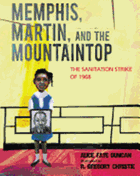
 When discussing Dr. Martin Luther King Jr. with kids, it's tempting to focus on his best known and most uplifting campaigns, like the Montgomery bus boycott and the historic March on Washington. With Memphis, Martin, and the Mountaintop: The Sanitation Strike of 1968, Alice Faye Duncan, the author of several previous children's books, takes as her subject King's last campaign, and she makes clear that, while he didn't live to see its outcome, his work was not in vain.
When discussing Dr. Martin Luther King Jr. with kids, it's tempting to focus on his best known and most uplifting campaigns, like the Montgomery bus boycott and the historic March on Washington. With Memphis, Martin, and the Mountaintop: The Sanitation Strike of 1968, Alice Faye Duncan, the author of several previous children's books, takes as her subject King's last campaign, and she makes clear that, while he didn't live to see its outcome, his work was not in vain.Memphis, Martin, and the Mountaintop is narrated by a nine-year-old black girl named Lorraine Jackson, whose father is a sanitation worker. (According to Duncan's acknowledgments, she culled details of Lorraine's narrative from the childhood memories of Dr. Almella Starks-Umoja, a teacher.) In February 1968, Lorraine's dad returns to their Memphis home to report that two of his coworkers were killed by a malfunctioning garbage truck. The air has been thick with talk of a strike due to the overwhelmingly black sanitation crews' outrageously low wages and abysmal working conditions, and these senseless deaths spur action. When 1,300 Memphis sanitation workers strike on February 12, 1968, Lorraine's father is among them. She feels both pride in his activism--"My daddy marched... for better pay. He marched for decent treatment. My daddy marched for me"--and the corresponding financial pinch: their home loses power and phone service, and Lorraine can forget about pocket change for candy.
After organizations including the NAACP show support for the strike, so does Lorraine's mother: "In her right hand she carried her boycott sign. In her left, she held my hand." Spirits soar at news that Dr. King will be joining the struggle in Memphis, and Lorraine gets to take a day off from school to march with him. R. Gregory Christie, whose innumerable illustrator credits include Freedom in Congo Square, displays his unmistakable style: he sets elaborately tended faces and forms against less worked-over slabs of color; in his ennobling art, humanity is always paramount.
When the march turns violent, King leaves the city and promises to come back to lead a more peaceful protest; it's after his return that he's killed on April 4. But this doesn't end Lorraine's story. A memorial march takes place on April 8 to honor the fallen leader, and this time, they're accompanied by King's widow, Coretta Scott King. The strike concludes eight days later, when James Reynolds, President Johnson's labor official, helps negotiate a settlement between the workers and the Memphis City Council. King's death isn't the main story in Memphis, Martin, and the Mountaintop; it's a tragic part of an inspiring account in which a heroic campaign lost its leader but nevertheless marched on to victory. --Nell Beram, freelance writer and YA author
Shelf Talker: This fictionalized account of Memphis's sanitation strike of 1968, relayed by a child witness, makes Martin Luther King Jr.'s death a tragic part of the story but not its last word.

